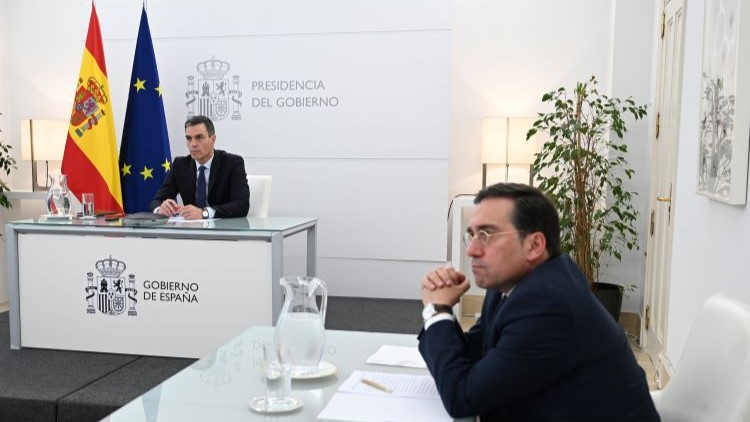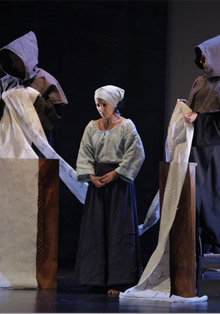Eduardo González
The acting President of the Government, Pedro Sánchez, yesterday offered the rest of the EU leaders the possibility of raising the political profile of the next meeting of the Union for the Mediterranean (UfM), which will be held on November 27 in Barcelona and in which “Israel and Palestine will sit on equal terms”, to “relaunch the Euro-Arab dialogue” and avoid a regional escalation of the Middle East conflict.
Sánchez participated yesterday by videoconference in the extraordinary meeting of the European Council called on an emergency basis to analyze the situation generated by the Hamas terrorist attacks against Israel and by the Israeli military response in the Gaza Strip. The meeting began with a minute of silence in memory of the victims in Israel and Palestine and for the recent attacks perpetrated on European soil.
During the Council meeting, the 27 agreed on the need to maintain a “united and firm” position against Hamas terrorist attacks and ratified the minimum agreement reached last Sunday, which includes Israel’s right to defend itself within the law. international and humanitarian.
Likewise, they expressed their fear that the war between Israel and Hamas will cause a new escalation of Islamist attacks in Europe (after the stabbing of a teacher in France and the shooting of two fans of the Swedish national team in Belgium) and they pledged , in this context, to strengthen cooperation between the security forces of the Member States and to combat hate speech. Member States also committed to intensifying dialogue with Israel and all countries in the region to avoid a regional escalation of the conflict and to reinforce humanitarian aid to Palestine.
During her speech, the president of the European Commission, Ursula von der Leyen, warned of the need to avoid an escalation of war and assured that “all” the Arab leaders with whom she has spoken “are aware of the importance of financing the “EU and are aware that this regional conflict cannot escalate because it would jeopardize EU funding to the region.”
In the same sense, the president of the European Council, Charles Michel, expressed the commitment of the entire EU to “do everything possible so that the conflict does not escalate to the regional level because it would be a much greater risk” and because “the only country that benefiting from an escalation in the region is Russia”, and warned of the need to fight “against anti-Semitism and Islamophobia” and to manage the migratory aspect of the conflict, especially with border states such as Spain or Italy or in third countries such as Egypt.
Pedro Sánchez
For his part, Pedro Sánchez reiterated, during his speech, that Israel has the right to defend itself, but warned that any defense action must be framed “within International Law and International Humanitarian Law”, in line with the common position adopted this past Sunday for the Twenty-Seven.
The acting President of the Government also warned that the absolute priority in the short term is to protect civilians and prevent the conflict from escalating and reiterated that “only through the two-state solution can the violence be stopped and resolved definitively a conflict that causes so much suffering.”
Pedro Sánchez also recalled that the next meeting of the Union for the Mediterranean will take place in Barcelona on November 27. “In this forum, Israel and Palestine will sit on equal terms, and both Europeans and Arabs will sit around the table,” he said. “It is a good opportunity that we have to take advantage of,” he said. For this reason, the President of the Government proposed to the rest of the European leaders that the political profile of this event be raised to “use this platform to relaunch the Euro-Arab dialogue” and help avoid a regional escalation of the conflict.
President Sánchez also announced that Spanish Cooperation will contribute more than four million additional euros to Palestine between now and the end of the year. “In 2023, we will reach 21.5 million between cooperation and humanitarian aid, which is 30% more than in 2022,” he said. Likewise, he warned of the need to guarantee the arrival of humanitarian aid to Gaza and to maintain essential supplies in this territory, especially water and electricity, and demanded the immediate and unconditional release of all hostages, among whom is the Spanish Iván Illarramendi (as confirmed yesterday by the Israeli Ministry of Foreign Affairs).
More reactions to the Embassy statement
Meanwhile, yesterday the controversy generated by the statement from the Israeli Embassy, issued on Monday, continued to rage in Spain, in which it described as “immoral” the statements of “some members of the Spanish Government” and accused “certain elements within the Government Spanish” of “aligning with this ISIS-type terrorism”, in reference to the position of the most leftist members of the coalition government regarding Israel’s war against Hamas. Hours later, the Ministry of Foreign Affairs released a note in which it stated that the Government “flatly” rejected the “falsehoods expressed in the statement from the Israeli Embassy about some of its members” and warned that it “does not accept unfounded insinuations about they”.
The acting Minister of Foreign Affairs, José Manuel Albares, yesterday considered the “specific incident” with Israel “settled” and explained, during the press conference after the Council of Ministers, that he had spoken on Monday afternoon with the ambassador of Israel in Spain, Rodica Radian-Gordon, to convey her “deep displeasure” at the “unfriendly” statement from the Embassy. Likewise, he recalled that each minister has his “perimeter” and manages “specific policies” and, “with regard to foreign policy, it is very evident that there are only two authorized voices, that of the President of the Government, of course, and that of the Minister of Foreign Affairs.”
The controversy arose, above all, from statements by the Minister of Social Rights and leader of Podemos, Ione Belarra, in which she requested that Israel be brought before the International Criminal Court (ICC) for the alleged war crimes that were being carried out. committing in Gaza. Belarra herself once again added fuel to the fire yesterday during an interview on Catalunya Ràdio, in which she urged “changing the narrative” about the war between Israel and Hamas and to recognize that what the Israeli Army is doing in Gaza are crimes. of war. According to Belarra, “no one denies the pain over the deaths of Israeli civilians,” but Israel does forget “the pain of the Palestinians.”
In the midst of the controversy, the leader of the PP, Alberto Núñez Feijóo, warned yesterday that “now is not the time to have a conflict with Israel,” but “unfortunately we already have one.” “I am very sorry that my country has a diplomatic problem with Israel and I think that the President of the Government should put things in order, although I understand that Sumar’s votes and Podemos’s votes are decisive for him to continue as President of the Government,” he said.
On the other hand, the Israeli Ministry of Foreign Affairs confirmed yesterday that the Spanish Iván Illarramendi (46 years old and native of Zarautz), whose whereabouts have been unknown since the attacks on October 7 in Israel, is among the 200 hostages held by Hamas. On October 9, Albares reported that there were two Spaniards “affected” by the Hamas attack and two days later he confirmed the death of the Spanish Maya Villalobo, 19, who was doing military service in Israel. Illarramendi was with his wife, a Chilean national, in Kissufim, a kibbutz very close to the border with the Gaza Strip that was attacked by Hamas.







